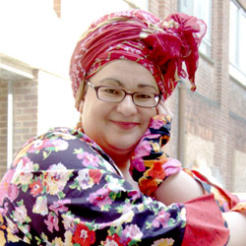Kids Company, which supports 17,000 young people in London every year, has launched an urgent appeal for funding to expand, in the face of research which shows that up to one million children could be living in vulnerable families in the UK by 2015.
The charity, headed by its founder Camila Batmanghelidjh (pictured), pleads on its website for funding in order to support its services:
"We really need your help; Kids Company is very short of money. The number of children seeking sanctuary with us has gone up and many of them are arriving at our street-level centres hungry and without anywhere to live," the statement from Batmanghelidjh advises.
"In the last 16 years Kids Company has had no money from local authorities for our social care and mental health work with vulnerable children, so we are entirely reliant on charitable donations and the goodwill of the public. We look posh, we look rich, but believe me, all we do is beg," she adds.
A spokeswoman for the charity told civilsociety.co.uk that the charity will launch in Bristol shortly. Unable to provide further details, the spokeswoman said: "We are looking to expand, we're in the process of setting up Kids Company Bristol and we're applying for tenders to set up elsewhere...We need to expand because we've got more kids to feed and take care of."
The expansion comes as joint research by the NSPCC, the Children’s Society and Action for Children warns that one million children in the UK, the equivalent of three children in every classroom, will be facing serious deprivation by 2015.
In the eye of the storm: Britain’s forgotten children and families calculates the impact of the recession and cuts on vulnerable children, the first time such a study has been commissioned. It claims that the most vulnerable families with children will be "disproportionately affected by tax and benefit changes and significantly affected by other cuts in spending". By 2015, it says, vulnerable families will be £3,000 worse off every year as a result of these measures.
The NSPCC, Children's Society and Action for Children currently help 400,000 children between them every year. Their research, they say, shows that the number of vulnerable families and children is "often understated", but that "on whatever definition, their number will grow sustantially in the coming years".
The study used the Families and Children Study dataset, which was used by the Cabinet Office in 2007 to identify families at risk. The dataset identified seven vulnerabilities:
- Worklessness – no parent in the family is in work;
- Housing – the family lives in poor quality and/or overcrowded housing;
- Qualifications – no parent in the family has any academic or vocational qualifications;
- Mental health – the mother has mental health problems;
- Illness/disability – at least one parent has a limiting long-standing illness, disability or infirmity;
- Low income – the family has low income (below 60 percent of the median);
- Material deprivation – the family cannot afford a number of food and clothing items
However the children's charities say that the Cabinet Office defined those at risk as those families with five or more of the criteria, branding this threshold "entirely arbitrary". The new report looks at those families with both fewer and more or these characteristics "to give a more complete picture of the extent of vulnerability".
The spokeswoman for Kids Company, which has a budget of roughly £16m per year, and rising, said that its difficulty is not a reduction in donations, but an increase in demand for services. The charity launched the 'plate pledge' appeal in February to raise around £1m to provide 580,000 meals for vulnerable children. It has since seen 157,795 meals pledged. But, she advised, despite the relative success of the campaign, "essentially we're always very short of money, for what we do we're on a shoestring really".










